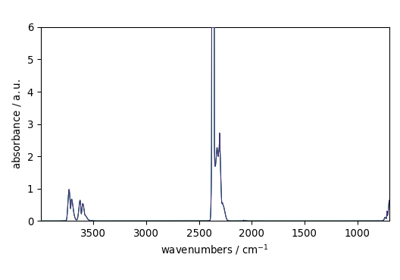spectrochempy.read_opus¶
- read_opus(*paths, **kwargs)[source]¶
Open Bruker OPUS file(s).
Eventually group them in a single dataset. Only Absorbance spectra are extracted (“AB” field). Returns an error if dimensions are incompatibles.
- Parameters
*paths (
str,Pathobject objects or valid urls, optional) – The data source(s) can be specified by the name or a list of name for the file(s) to be loaded:e.g., ( filename1, filename2, …, **kwargs )*
If the list of filenames are enclosed into brackets:
e.g., ( [ filename1, filename2, … ], **kwargs )
The returned datasets are merged to form a single dataset, except if
mergeis set toFalse.If a source is not provided (i.e., no
paths, norcontent), a dialog box will be opened to select files.**kwargs (keyword parameters, optional) – See Other Parameters.
- Returns
object (
NDDatasetor list ofNDDataset) – The returned dataset(s).- Other Parameters
protocol (
str, optional) –Protocolused for reading. It can be one of {'scp','omnic','opus','topspin','matlab','jcamp','csv','excel'}. If not provided, the correct protocol is inferred (whenever it is possible) from the filename extension.directory (
Pathobject objects or valid urls, optional) – From where to read the files.merge (
bool, optional, default:False) – IfTrueand several filenames or adirectoryhave been provided as arguments, then a singleNDDatasetwith merged (stacked along the first dimension) is returned.sortbydate (
bool, optional, default:True) – Sort multiple filename by acquisition date.description (
str, optional) – A Custom description.origin (one of {
'omnic','tga'}, optional) – Used when reading with the CSV protocol. In order to properly interpret CSV file it can be necessary to set the origin of the spectra. Up to now only'omnic'and'tga'have been implemented.csv_delimiter (
str, optional, default:csv_delimiter) – Set the column delimiter in CSV file.content (
bytesobject, optional) – Instead of passing a filename for further reading, a bytes content can be directly provided as bytes objects. The most convenient way is to use a dictionary. This feature is particularly useful for a GUI Dash application to handle drag and drop of files into a Browser.iterdir (
bool, optional, default:True) – IfTrueand no filename was provided, all files present in the provideddirectoryare returned (and merged ifmergeisTrue. It is assumed that all the files correspond to current reading protocol.Changed in version 0.6.2:
iterdirreplace the deprecatedlistdirargument.
See also
readGeneric reader inferring protocol from the filename extension.
read_zipRead Zip archives (containing spectrochempy readable files)
read_dirRead an entire directory.
read_labspecRead Raman LABSPEC spectra (
.txt).read_omnicRead Omnic spectra (
.spa,.spg,.srs).read_socRead Surface Optics Corps. files (
.ddr,.hdror.sdr).read_galacticRead Galactic files (
.spc).read_quaderaRead a Pfeiffer Vacuum’s QUADERA mass spectrometer software file.
read_topspinRead TopSpin Bruker NMR spectra.
read_csvRead CSV files (
.csv).read_jcampRead Infrared JCAMP-DX files (
.jdx,.dx).read_matlabRead Matlab files (
.mat,.dso).read_carroucellRead files in a directory after a carroucell experiment.
read_wireRead REnishaw Wire files (
.wdf).
Examples
Reading a single OPUS file (providing a windows type filename relative to the default
datadir)>>> scp.read_opus('irdata\\OPUS\\test.0000') NDDataset: [float64] a.u. (shape: (y:1, x:2567))
Reading a single OPUS file (providing a unix/python type filename relative to the default
datadir) Note that here read_opus is called as a classmethod of the NDDataset class>>> scp.NDDataset.read_opus('irdata/OPUS/test.0000') NDDataset: [float64] a.u. (shape: (y:1, x:2567))
Single file specified with pathlib.Path object
>>> from pathlib import Path >>> folder = Path('irdata/OPUS') >>> p = folder / 'test.0000' >>> scp.read_opus(p) NDDataset: [float64] a.u. (shape: (y:1, x:2567))
Multiple files not merged (return a list of datasets). Note that a directory is specified
>>> le = scp.read_opus('test.0000', 'test.0001', 'test.0002', >>> directory='irdata/OPUS') >>> len(le) 3 >>> le[0] NDDataset: [float64] a.u. (shape: (y:1, x:2567))
Multiple files merged as the
mergekeyword is set to true>>> scp.read_opus('test.0000', 'test.0001', 'test.0002', directory='irdata/OPUS', merge=True) NDDataset: [float64] a.u. (shape: (y:3, x:2567))
Multiple files to merge : they are passed as a list instead of using the keyword ` merge`
>>> scp.read_opus(['test.0000', 'test.0001', 'test.0002'], >>> directory='irdata/OPUS') NDDataset: [float64] a.u. (shape: (y:3, x:2567))
Multiple files not merged : they are passed as a list but
mergeis set to false>>> le = scp.read_opus(['test.0000', 'test.0001', 'test.0002'], >>> directory='irdata/OPUS', merge=False) >>> len(le) 3
Read without a filename. This has the effect of opening a dialog for file(s) selection
>>> nd = scp.read_opus()
Read in a directory (assume that only OPUS files are present in the directory (else we must use the generic
readfunction instead)>>> le = scp.read_opus(directory='irdata/OPUS') >>> len(le) 4
Again we can use merge to stack all 4 spectra if thet have compatible dimensions.
>>> scp.read_opus(directory='irdata/OPUS', merge=True) NDDataset: [float64] a.u. (shape: (y:4, x:2567))
